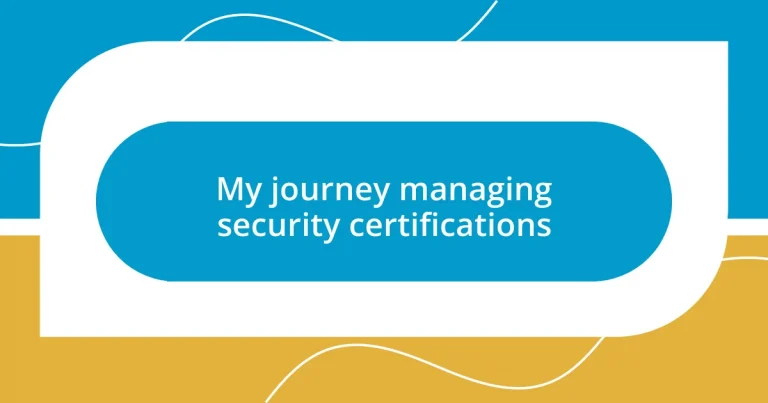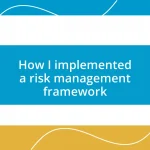Key takeaways:
- The right security certification can significantly enhance your career by aligning your skills with industry demands and increasing job opportunities.
- Effective preparation strategies, including time management, practice exams, and study groups, can lead to greater confidence and successful exam outcomes.
- Ongoing education and networking are vital for maintaining certifications and can lead to unexpected career advancements and professional growth.
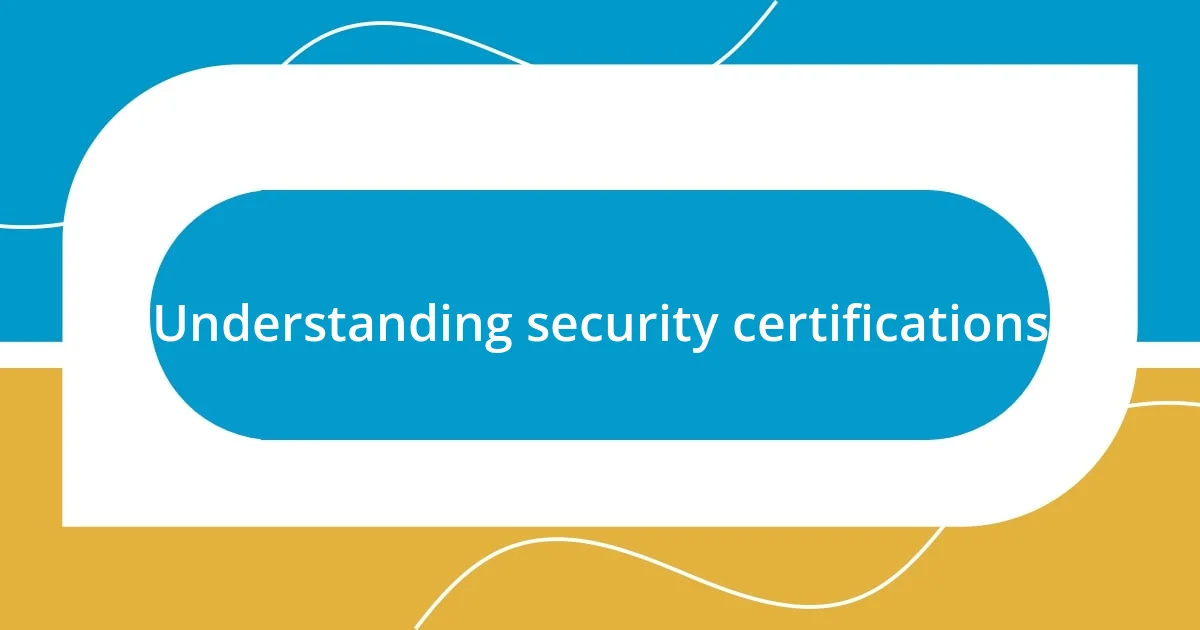
Understanding security certifications
When I first delved into security certifications, I was surprised by the sheer variety available. It’s almost overwhelming, isn’t it? From CompTIA Security+ to CISSP, each certification has its own focus, prerequisites, and relevance. Understanding the distinctions can really shape your career path, allowing you to align your skills with industry demands.
I remember feeling a mix of excitement and anxiety as I weighed which certification to pursue. It’s crucial to consider not just what sounds impressive, but what genuinely interests you. Have you ever thought about how the right certification could open doors in your career? For me, choosing the right one meant the difference between simply passing an exam and truly deepening my knowledge and expertise.
The emotional rollercoaster of studying for these certifications is another dimension I found fascinating. There were times I felt incredibly motivated, confident I could conquer the material, but there were also moments of self-doubt that creeped in, particularly during tough subjects. Can you relate? I learned that this journey was not just about obtaining credentials; it was about building resilience and a deeper understanding of security’s critical role in our increasingly digital world.
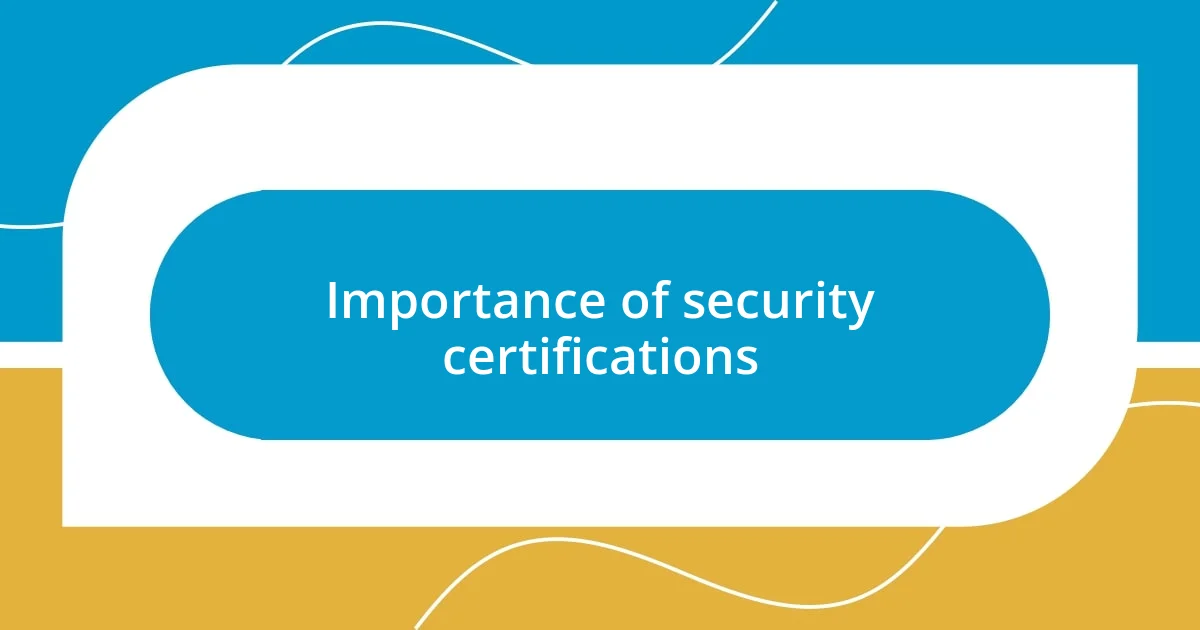
Importance of security certifications
Security certifications are not just badges of honor; they are essential tools in today’s tech-driven landscape. They signal to employers that you possess the requisite skills and knowledge to protect valuable information and systems. I recall a time when I applied for a cybersecurity role and the hiring manager immediately recognized my CompTIA Security+ certification. It was a pivotal moment that made me realize just how much credibility these certifications can carry in the field.
Here are a few key reasons why security certifications are important:
- Demonstration of expertise: Certifications validate your skill set and knowledge in specific areas of security.
- Career advancement: Many employers prioritize candidates with certifications, which can lead to promotions and higher salaries.
- Networking opportunities: Certifications often connect you with professional organizations and communities, enhancing your network.
- Staying current: The certification process often requires ongoing education, keeping your skills up-to-date in a rapidly evolving field.
- Boosting confidence: Earning a certification can bolster your self-assurance, knowing you have met rigorous standards in your profession.
Thinking back, that feeling of pride I had after passing my Certified Information Systems Security Professional (CISSP) exam was unforgettable. It reinforced my commitment to the field and fueled my passion for continuous learning and growth in cybersecurity.
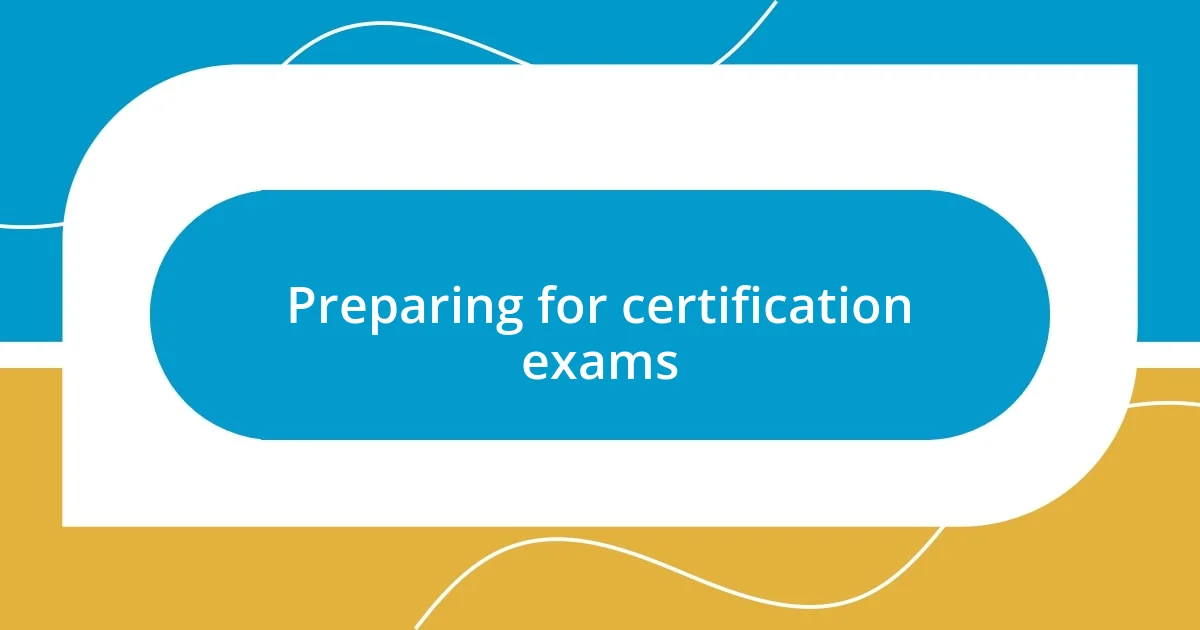
Preparing for certification exams
Preparing for certification exams can feel like gearing up for a marathon. I vividly remember creating a study schedule that resembled a military operation, down to the hour. It helped me manage my time, but honestly, I also needed breaks to recharge. Have you tried treating study sessions like workouts? Short, focused bursts of intensity, followed by rest, can improve retention.
As I delved deeper into the materials, I discovered the power of practice exams. They weren’t just a stress test; they provided a real glimpse into the types of questions I’d face. I would simulate exam conditions right at my kitchen table—quite the scene! Trust me, nothing prepares you better than knowing what to expect. Have you ever taken a practice exam yourself? It can be revealing in ways you might not anticipate.
Finally, don’t underestimate the value of a study group. Sharing insights and tackling tough topics together can lighten the load. I remember my peers and I diving into complex subjects, and it felt like we were solving mysteries. The camaraderie not only made studying enjoyable but also drove me to perform better. How about you—have you considered the benefits of learning alongside others?
| Preparation Method | Description |
|---|---|
| Time Management | Create a structured study plan to maximize efficiency. |
| Practice Exams | Utilize realistic practice tests to familiarize yourself with exam formats. |
| Study Groups | Engage with peers to enhance understanding through discussion. |
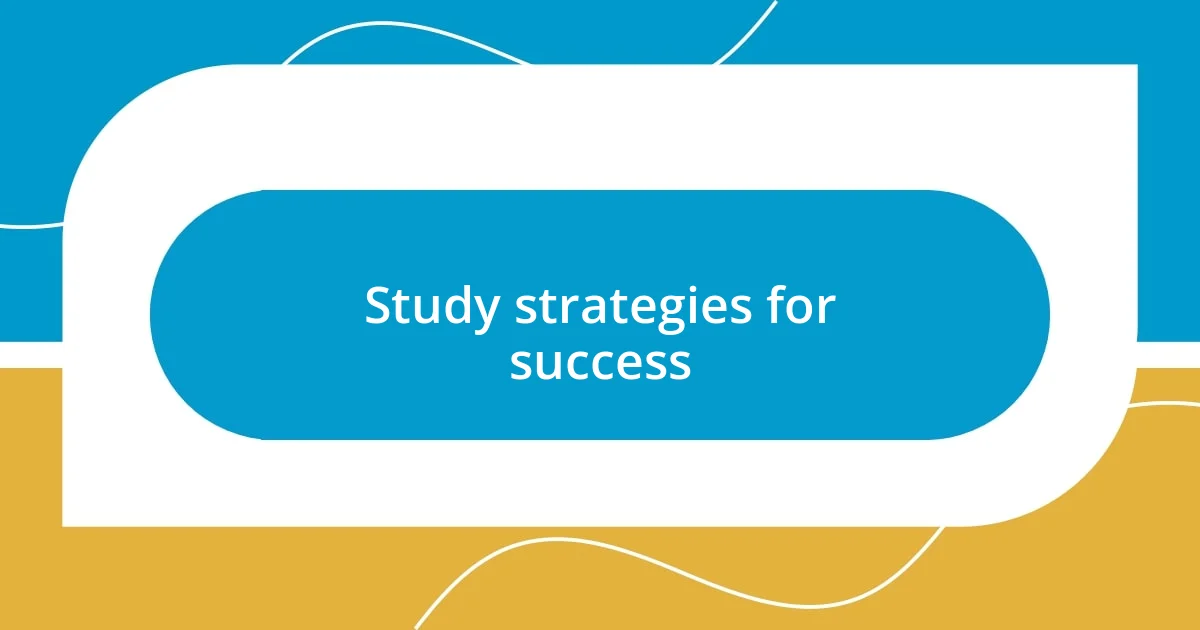
Study strategies for success
When it comes to study strategies for success in security certifications, I found that mixing different methods truly worked wonders. I vividly remember dedicating quiet evenings to reading dense materials while sipping on herbal tea, which not only helped me focus but also made the experience feel cozy and less intimidating. Have you ever paired your study time with a favorite drink? It can create a calming atmosphere that’s conducive to learning.
Another technique I employed was the use of flashcards. I’d jot down key concepts and terms that often tripped me up, and then challenge myself with them during commutes. There’s something satisfying about flipping through those cards, feeling a sense of achievement as I recalled information I once struggled with. Have you ever noticed how tactile learning can enhance memory? It’s an active way to engage with the material beyond just reading.
Lastly, I can’t emphasize enough the importance of regular self-assessment. I made it a ritual to reflect on my progress weekly and pinpoint areas that needed extra attention. This practice not only kept me motivated but also transformed my study sessions into a more dynamic experience. How often do you pause to assess your learning journey? Taking a moment to celebrate small victories can truly elevate your study mindset.
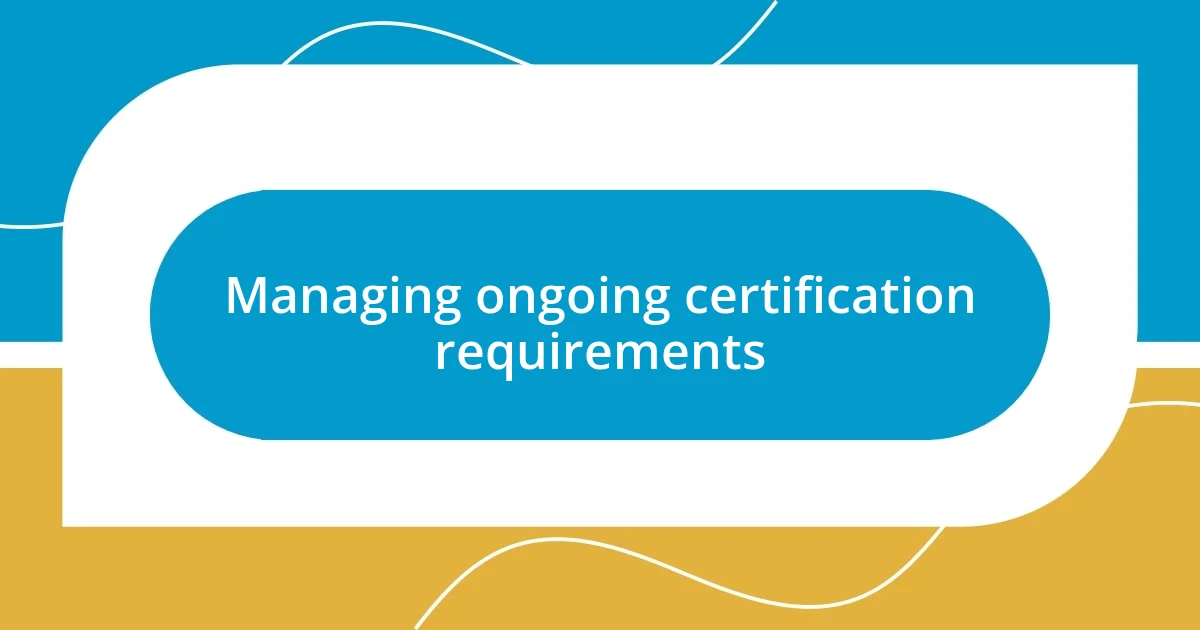
Managing ongoing certification requirements
Managing ongoing certification requirements can feel like trying to juggle flaming torches, especially as the deadlines approach. I found myself creating a calendar just for tracking renewals and continuing education credits. Let me tell you, having those key dates laid out not only eased my anxiety but also transformed what felt overwhelming into a manageable task. Have you ever charted your obligations? It’s a game-changer.
As I navigated this process, I discovered the importance of setting aside dedicated time for professional development. I remember blocking out one Saturday a month to focus solely on earning those required continuing education units. It turned studying into a treat I looked forward to, not a chore. Incorporating learning into my routine made it less daunting—has time management ever changed your perspective on obligations?
Networking also became a vital component of maintaining my certifications. Every time I attended industry events, I was pleasantly surprised by how many resources were available for ongoing education. I once met someone who shared tips on lesser-known workshops that helped me earn credits more easily. Have you considered how connecting with others in your field could open new doors for your learning journey? It’s not just about the certificates; it’s about the relationships that enrich your professional growth.
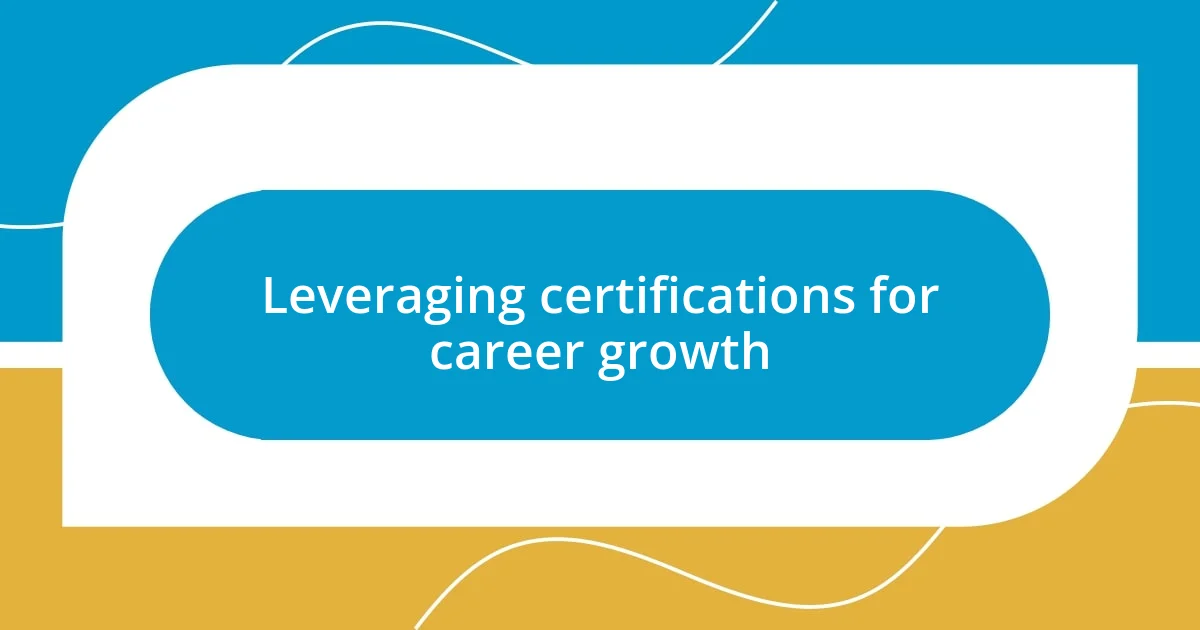
Leveraging certifications for career growth
Focusing on certifications transformed my career trajectory. Once, after earning a significant credential, I felt an immediate surge of confidence during job interviews. I vividly recall landing a promotion shortly after—my new designation was more than just a line on my resume; it was a tangible proof of my commitment and expertise. Have you ever felt that rush of validation from your hard work? It can truly propel you forward.
Furthermore, leveraging certifications opened unexpected doors. I remember attending a conference and striking up a conversation with a hiring manager who was impressed by my recent certifications. That interaction ultimately led to an exciting job offer that aligned perfectly with my career goals. Have you considered how showcasing your credentials can enhance your networking opportunities? Your certifications can serve as powerful icebreakers that spark meaningful conversations.
Lastly, the journey of acquiring certifications also nurtured a deeper understanding of my field. Each credential I pursued expanded my knowledge base, allowing me to contribute more effectively in team settings. I often found that my insights in discussions were met with enthusiasm and respect, and it felt rewarding to share what I had learned. How has your own learning journey enriched your professional interactions? It’s incredible how certifications can connect you with like-minded individuals who value continuous growth.












